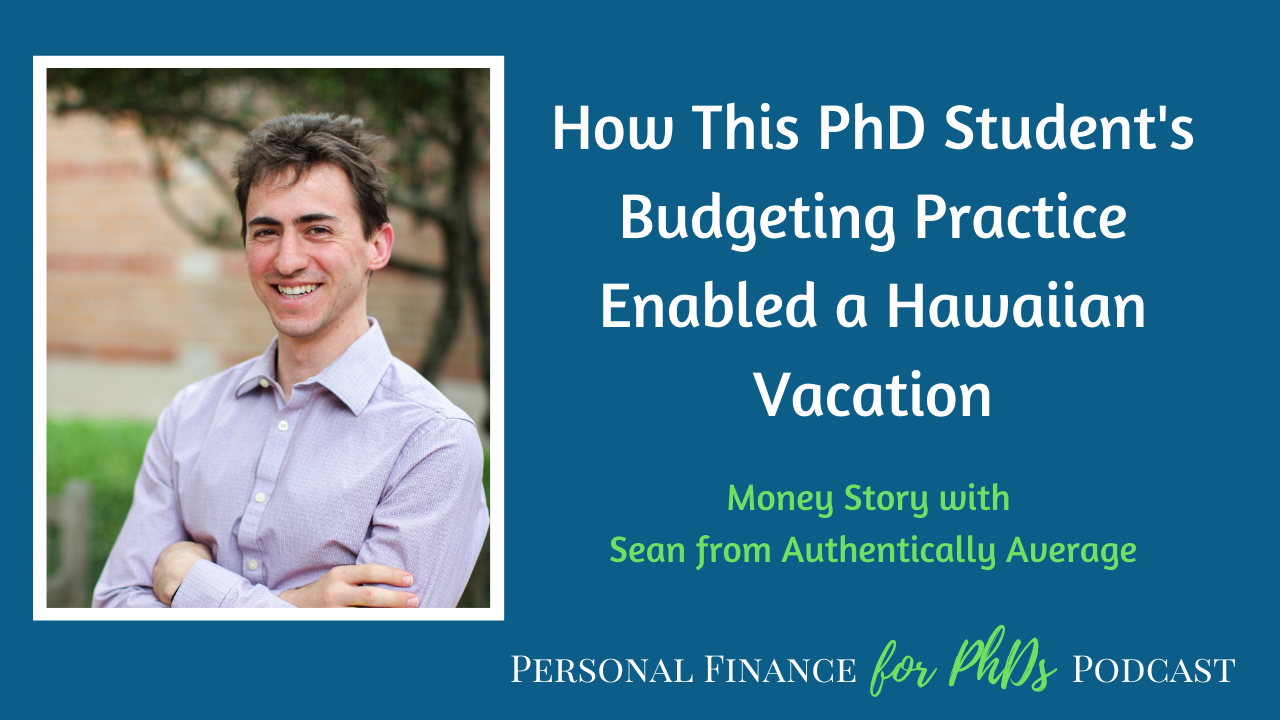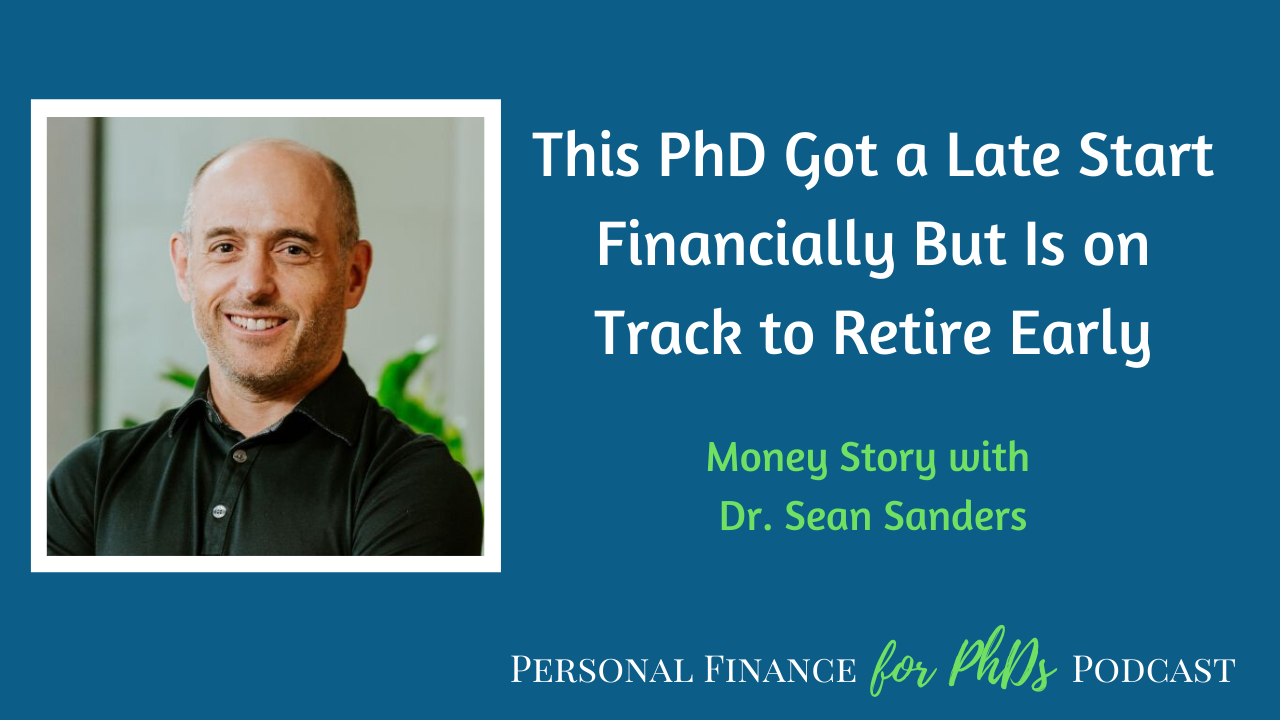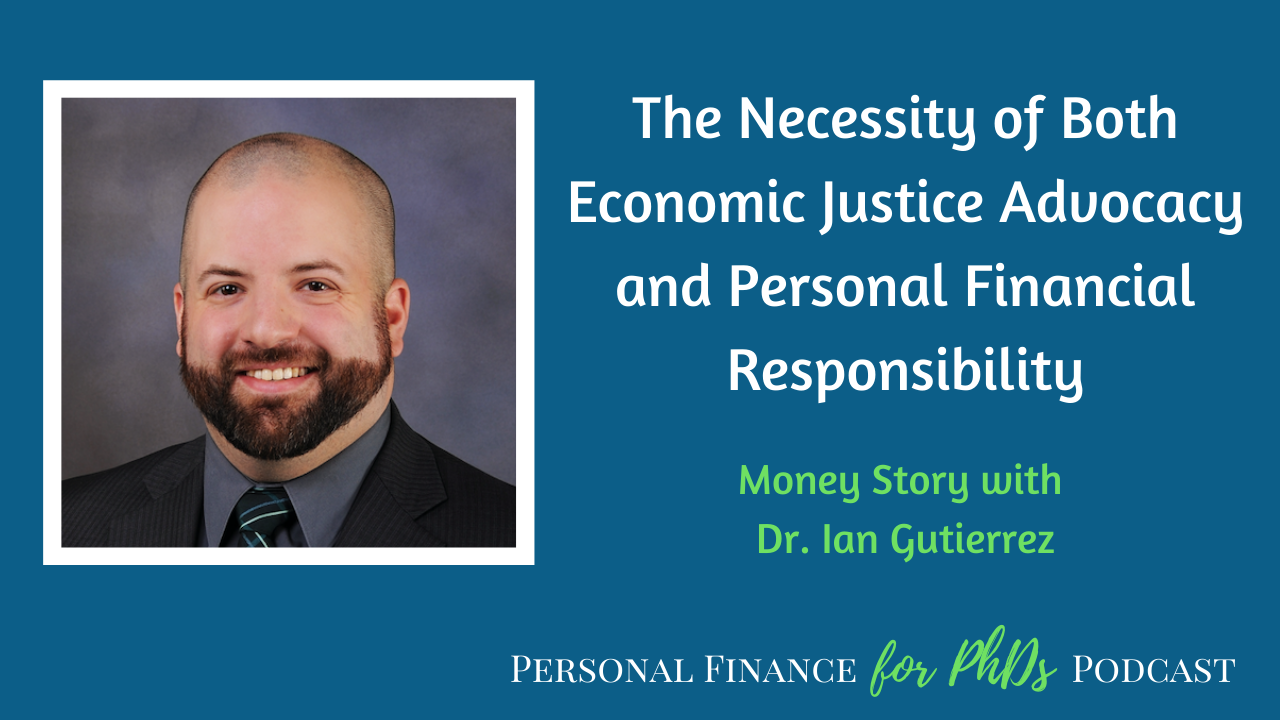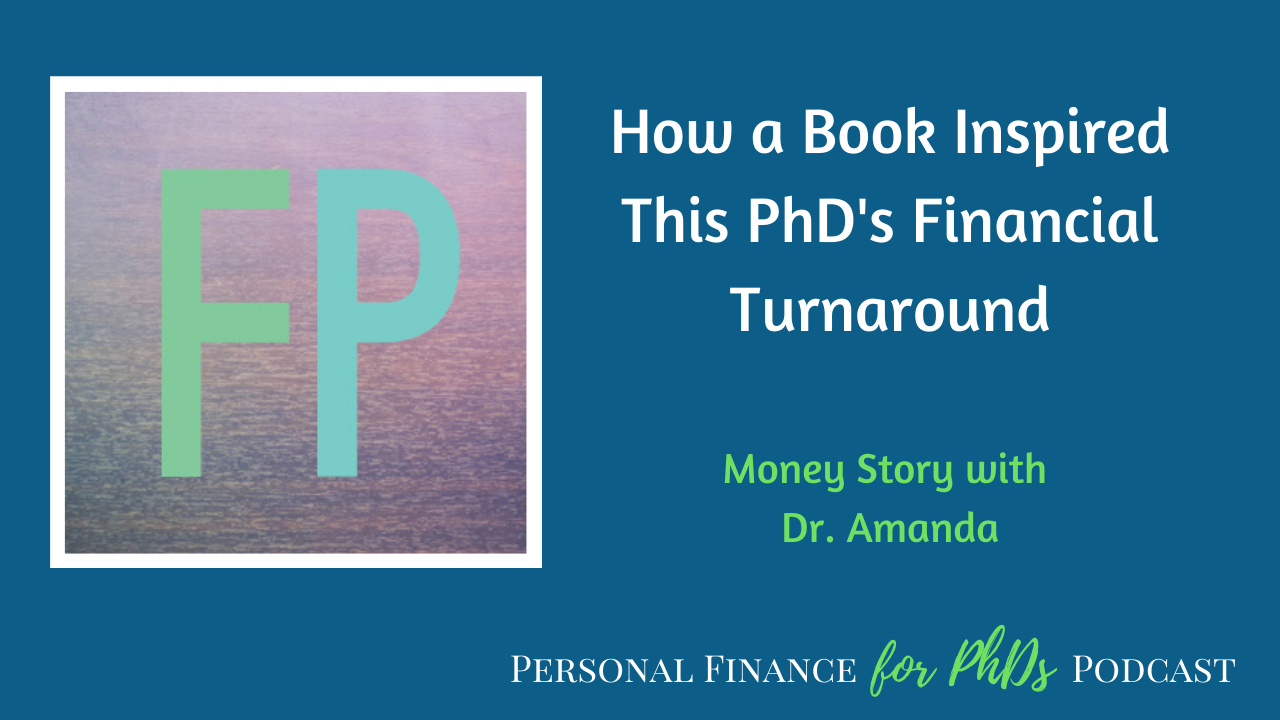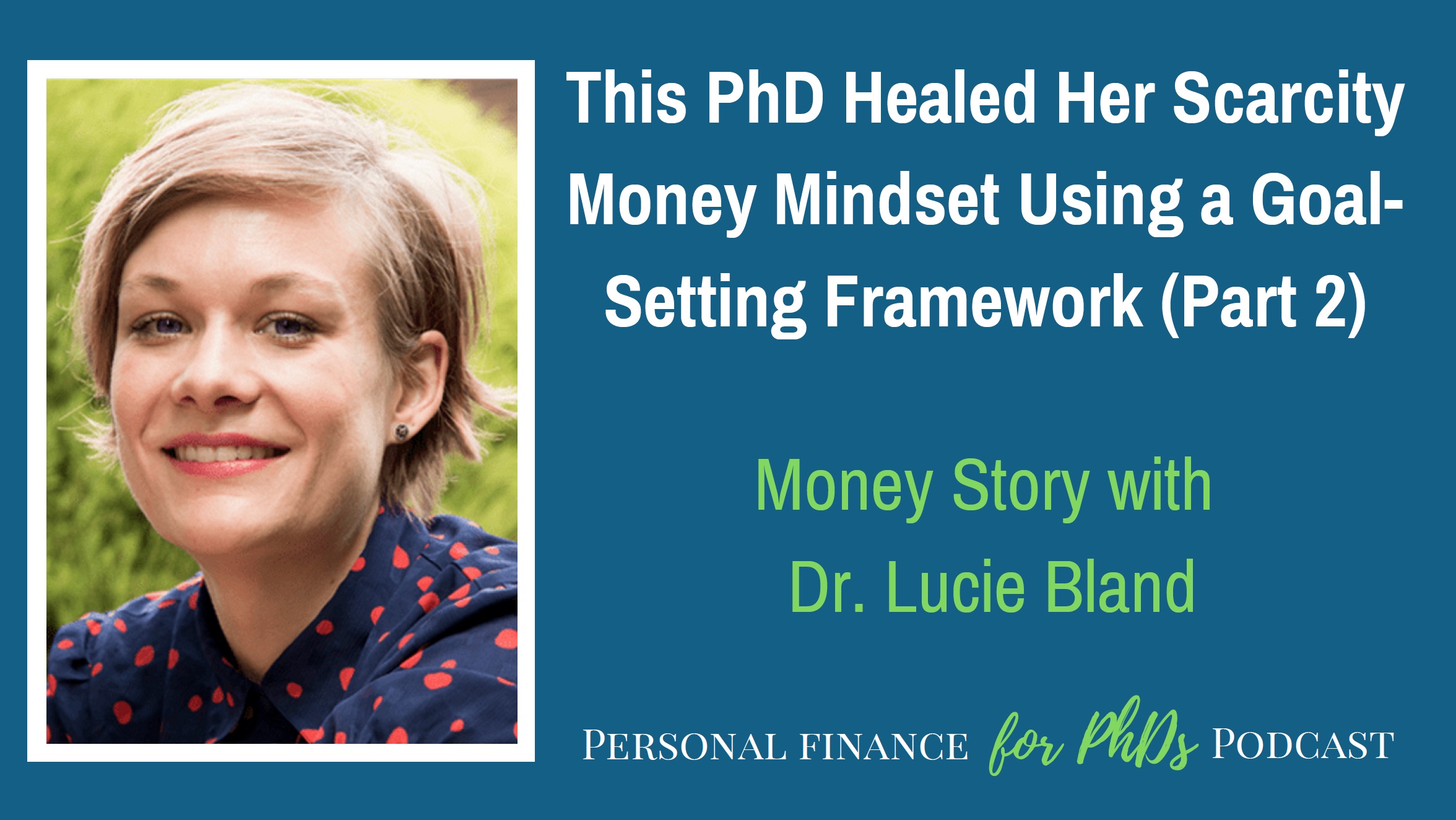In this episode, Emily interviews Joumana Altallal, a Muslim graduate student at the University of Michigan. Joumana began investigating personal finance in the summer before she started graduate school to prepare to manage her stipend. In just her first year on a stipend, she has saved a full emergency fund, established credit, and funded a Roth IRA. Joumana shares what she’s learned about Halal investing, a strain of socially responsible investing for Muslims that has become much more accessible in recent years with the rise of robo-investing. Joumana’s enthusiasm for personal finance and halal investing, in particular, has spilled into her relationships with her family and friends. At the end of the episode, she gives a wonderful articulation of the role her finances play in the world.
Links Mentioned in the Episode
- UMich Helen Zell Writers’ Program
- PF For PhDs Episode 8: This PhD Government Scientist Is Pursuing Financial Independence: Part 1 (Dr. Gov Worker)
- PF for PhDs Episode 9: This PhD Government Scientist Is Pursuing Financial Independence: Part 2 (Dr. Gov Worker)
- George Hayward Household Budget YouTube Video
- George Hayward Household Budget Excel Template
- Halal Investment Companies, e.g.,
- Wahed Invest: https://wahedinvest.com/
- Amana Mutual Funds: https://www.saturna.com/amana
- Azzad Funds: https://www.azzadfunds.com/
- PF for PhDs: Speaking
- PF for PhDs Episode 13: Combatting Climate Change with Your Finances, Individually and Collectively (Jewel Tomasula)
- PF for PhDs Podcast Hub
- PF for PhDs: Subscribe
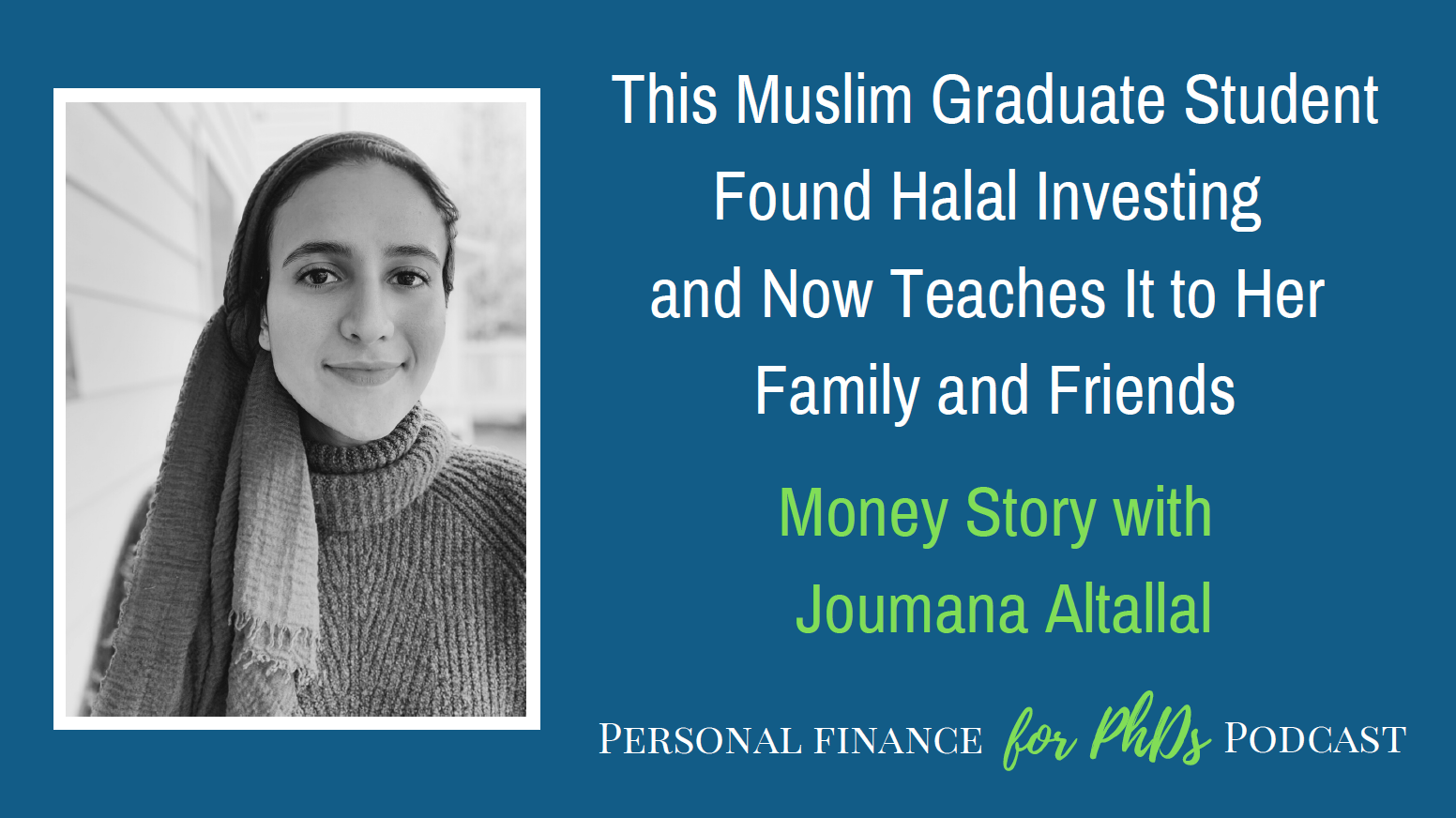
Teaser
00:00 Joumana: I think taking a halal approach to investing and saving money is always really grounding for me in that it acts as this constant reminder, that at the end of the day, my finances are meant to serve an ethical role in the world. So, they’re not just a fulfillment for my own needs and desires, but that they also function in this greater, sort of just way in the world.
Introduction
00:28 Emily: Welcome to the Personal Finance for PhDs podcast, a higher education in personal finance. I’m your host, Dr. Emily Roberts. This is season six, episode 13, and today my guest is Joumana Altallal, a Muslim graduate student at the University of Michigan. Joumana began investigating personal finance in the summer before she started graduate school to prepare to manage her stipend. In just her first year on a stipend, she has saved a full emergency fund, established credit, and funded a Roth IRA. Joumana shares what she’s learned about halal investing, a strain of socially responsible investing for Muslims that has become much more accessible in recent years with the rise of robo-investing. Joumana’s enthusiasm for personal finance and halal investing in particular has spilled into her relationships with her family and friends. You won’t want to miss her wonderful articulation of the role her finances play in the world. Without further ado, here’s my interview with Joumana Altallal.
Will You Please Introduce Yourself Further?
01:28 Emily: I’m delighted to have joining me on the podcast today, Joumana Altallal. She is a current graduate student and also a Muslim graduate student. So, we’re going to be talking about a particular version of socially responsible investing today, which is halal investing. So, Joumana, thank you so much for coming on the podcast today. And will you please introduce yourself a little bit further to the audience?
01:49 Joumana: Hi, Emily. Thanks for having me today. My name is Joumana Altallal. I’m a second-year master of fine arts student in poetry at the University of Michigan. My family and I immigrated to the U.S. In 2003 and were resettled in Charlottesville, Virginia. So, that’s actually where I grew up since I was about six years old. And I would say my journey with personal finance has definitely been informed by my identity as both a refugee and a Muslim.
02:17 Emily: Yeah. Thank you so much for that. And tell us where you are now and what you’re studying.
02:21 Joumana: Yeah, absolutely. So, I’m at the University of Michigan at the Helen Zell Writers’ Program. So, it’s a creative writing program that is two years with a fellowship year third year. I am a poet, so I’m spending all of my time in writing workshops
02:37 Emily: Sounds fantastic. And you and I actually met when I was speaking at the University of Michigan in 2019, I guess it was, right?
02:46 Joumana: Yeah.
Personal Finance Journey
02:46 Emily: Yeah. So, I met in person, actually, you came up to me with this question about this particular version of investing, and I said, “I have no idea about that. Will you please come on the podcast and teach me and my audience about this?” So, I’m really happy to have you on today to talk more about that. So, kind of first step, more like background stuff before we get to that particular topic. So, what have you been learning about personal finance and also applying since you started graduate school?
03:15 Joumana: Yeah, absolutely. So, I actually came to graduate school immediately from undergrad. So, I didn’t have much experience budgeting or tracking money in a sort of systematic way before. And although I’d been obviously working throughout high school and college, I was still primarily supported by my parents. So, my financial decisions were definitely limited in that scope. But my interest in personal finance kind of grew out of a hobby that I had. The summer before moving for grad school, I was kind of introduced to the financial independence and early retirement movement through Reddit forums of all places. And I found myself sort of accidentally spending a lot of time reading people’s posts and advice to each other. So, I think part of what’s so great about personal finance forums, I guess, is that they don’t really assume a starting place for anyone, which was really helpful for me. You can ask questions as a beginner or share advice on an experience that you just went through. So, as someone coming from like an immigrant background, I saw my parents really struggle with understanding what things like 401ks were even. And I believe a huge part of that is because workplaces don’t use accessible language to really explain what these investment opportunities are. So, a huge group of people end up being like absolutely excluded from personal finance conversations despite having a right to them.
Financial Independence, Retire Early (FIRE)
04:49 Emily: So, I love that you were sort of introduced to personal finance inspired by the FIRE movement, something I’ve also been kind of getting into recently. FIRE, Financial Independence and [Retire Early]. I’ve actually done a couple, a pair of interviews with a PhD who’s pursuing FIRE in season three of the podcast. So, if people want to check that out, we’ll link that from the show notes. And also some of my other guests have sort of incidentally mentioned being inspired by the movement as well. Would you say that you are pursuing FIRE or going to be pursuing FIRE, maybe once you’re done with graduate school? Or are you just like, “No, I’m just using some of the principles for like general personal finance stuff”?
05:27 Joumana: I think right now I’m using the general principles for personal finance. It feels a little scary to say that I’m pursuing FIRE as a 22-year-old grad student. But that is absolutely something that I would love to one day be a little more stringent in following.
05:45 Emily: Yeah. So, for listeners who aren’t yet familiar or haven’t listened to the other podcasts on the subject. I think the reason why, you know, Joumana and I do not say we’re part of the FIRE movement is probably because we do not have savings rates that top 50% of our income, which is not a requirement to be part of the movement, but definitely something that many people within the movement do. And that’s how you get that, you know, really fast acceleration towards retirement. So, very difficult to carry out that particular aspect of it on a grad student kind of salary, but you can definitely use the broader principles, start using the broader principles that also apply to personal finance. That was really something that came out of my previous interview with Dr. Gov Worker, is that he really sees the FIRE movement as like an entrance into just good personal finance practices. It’s just a particular way to like inspire people to follow through on the stuff that everybody talks about, you know, from decades ago. So, yeah. What have you actually, like maybe things you’ve put into practice within your finances since last summer?
Building Credit and Budgeting
06:44 Joumana: Yeah, absolutely. So, the summer before grad school, my sort of first step into the journey was opening a student credit card through Discover which is something that prior to that I’d never had. So, beginning to build my credit was really important to me. And then obviously knowing that I would be receiving a monthly stipend once I began my MFA, I knew I needed some sort of system to track my income and expenses. So, I know there are apps like Mint that do this automatically, but I actually rely on a sort of extensive Excel spreadsheet that allows me to type things in manually the particular template that I’ve been using for the past year and a half just comes from George Hayward’s YouTube channel. But any, and all can achieve the same thing really.
07:31 Emily: We’ll track that down and put that in the show notes as well.
Emergency Fund and Roth IRA
07:35 Joumana: And the most important step I think after that was really focusing on building an emergency fund that I knew could last me for at least two months, but now I’ve brought it up to six months. And that’s actually advice that my parents have always followed. So, it didn’t feel too strange to me to begin doing. And after that, opening a Roth and beginning to stash away a monthly amount into my savings.
What is Halal Investing?
08:01 Emily: Yeah. Those are a fantastic number of steps to be taking just in like your first year or so of graduate school, especially that six month of expenses emergency fund. Very, very impressive. You must be living well below your means there in Ann Arbor. So, for those of us who like me, had never heard of halal investing before you brought it up. Can you tell us some of the differences between halal investing and maybe, you know, what your average American might be doing for investing?
08:28 Joumana: Yeah, absolutely. So, to kind of backtrack a little bit, in Islam, the word halal just means permissible. So, halal investing is just a faith-based approach to investment management that’s both ethically and socially responsible. Halal investing really just tries to eliminate placing money in interest-based investments and highly leveraged company stocks or in securities of companies whose profit is typically earned from things like firearms, alcohol, or gambling, for instance. So, as you can tell, it’s not just as easy as opening a Roth through Vanguard, for instance, and beginning to save. However, doing the research has really helped me understand what it is I’m doing with my money and how the process works.
09:17 Emily: Yeah. So, maybe to explain like, just a little bit further for the listeners. So, what you’re basically saying is no bonds, right? Because bonds are a debt-based product. So, stocks are okay. But you mentioned that you can’t use companies that are very highly leveraged, so that requires some additional degree of research. So, it sounds like some company stock would be okay, some wouldn’t. And then nothing in these certain categories of “the sin stocks” as they might be referred to. Okay. So, that gives us a basis there. Does that also mean that you don’t use like interest-bearing checking or savings account? Is that correct?
09:55 Joumana: Yes. So, typically I actually won’t put my money into the savings portion of my bank account and I just have it all stashed in terms of the like six-month emergency fund, I just have it in my checking account. Because interest isn’t necessarily something that I’d want on my money, the same way that most people would.
10:18 Emily: Yeah. Gotcha. When I read up about the subject a tiny bit before our conversation, I read that many who are pursuing halal investing actually will end up not investing in stocks at all because of that additional degree of research that’s required. Can you expand on that a little bit?
Halal Investment Companies
10:37 Joumana: Yeah, absolutely. I think for the average person, it can seem a little bit overwhelming to have to do all of this research all of a sudden. But I do think that there are actually a lot more solutions now than there were even just a few years ago. So, there are actually investment companies like Wahed Invest, Amana Mutal Funds, or Azzad and others that kind of facilitate the process of halal investing so that it’s not all entirely on the Muslim investor who doesn’t necessarily always know where to go or where to put their money. So, the way this works is that these companies essentially screen investments and identify companies that meet ethical standards based on halal investing. So, they also do things like help you calculate your annual Zakat percentage, which is just an obligatory charitable payment that has to be made on your earnings every year. And really the good thing with using these companies is that they have tickers that you can use to still invest through places like Schwab or Vanguard. So, realistically your Roth could still be with Schwab like I have it. But these companies by using tickers, these companies just screen all of the investments that you could have and provide you with places that you could potentially invest in.
Compromise: Higher Expense Ratios for Greater Flexibility
12:05 Emily: Okay. So, let me see if I have this right. So, basically, as I said earlier, this is sort of a particular version of socially responsible investing. So, this is a similar process that other socially responsible investing funds would go through, right? There’s a higher degree of screening of the companies that are included according to whatever the principles are that the fund operates under. And so it sounds like these companies that you just mentioned, they have created mutual funds, is that right? That then you can invest in maybe directly through them, but also through, as you just said, you know, other companies just by buying that particular mutual fund. And something that often happens with other SRI funds is that, due to that increased basically degree of work that’s required, the expense ratio is a little bit higher than you might find if you were doing like a standard index bond. Is that correct for like the investment that you chose?
12:54 Joumana: Yes, that’s typically correct. Although I know that companies like Wahed Invest, for instance, rely kind of heavily on robo-investors. So, the percentage is probably a lot lower. But yes, there are some kind of compromises that you make in terms of these investments that you choose to follow.
13:17 Emily: Yeah. So, one of the principles, let’s say, of the FIRE movement that you might come across, and also personal finance more generally, is this ruthless pursuit of low expense ratios on investments. And what expense ratios are for the listener, it’s basically just an expression of the cost of owning a particular fund. It’s expressed as a percentage. So, you know, at Vanguard with ETFs or something, you might get an expense ratio down in the 0.05 or less percentage. So, five basis points or less. They could be as low as that.
13:52 Emily: And then higher expense ratios are like 1%. Like 1% would be like pretty high. And there are many, you know, in between. And usually, with robo-advisors, you would have the underlying expense of the actual fund that you buy. So, like maybe 0.1% or less, plus a fee that the robo-advisor would tax on top of that to basically be managing your investments for you. But it sounds like even within this, you know, halal investing, even among these options, there are various expense ratios that you could be sort of pursuing and choosing among. Yeah, I think it’s one of the downfalls of the FIRE movement that SRI, socially responsible investing, is not talked about that much. And it’s very important to certain people for various different reasons. And so it’s something that is definitely worth, you know, maybe sacrificing a little bit on the low expense ratio side of things to, of course, in your case, be able to invest according to your principles at all. And for other people just being able to invest according to their general values and what they want to be supporting in our economy and so forth.
Commercial
14:54 Emily: Emily here for a brief interlude. I bet you and your peers are hungry for financial information right now, especially if it’s tailored for your unique PhD experience. I offer seminars, webinars, and workshops on personal finance for early-career PhDs that can be billed as professional development or personal wellness programming. My events cover a wide range of personal finance topics, or take a deep dive into the financial topics that matter most to PhDs like taxes, investing career transitions, and frugality. If you’re interested in having me speak to your group or recommending me to a potential host, you can find more information and ways to contact me at pfforphds.com/speaking. We can absolutely find a way to get this great content to you and your peers, even while social distancing. Now, back to our interview.
Halal Investing is Growing and Increasingly Accessible
15:53 Emily: Anything else you want to add about the products or the solutions that are available for halal investing?
16:00 Joumana: I would say that they are definitely doing a better job of reaching out to the Muslim population now. So, I think there’s a growing movement really of young Muslim students, or even young Muslim workers who are really active in the investment community, which is always lovely to see.
16:21 Emily: Yeah, absolutely. It seems like, you know, as you said, robo-advisors are now being involved and robo-advisors are a relatively recent phenomenon in the last five or 10 years. So maybe, you know, the last generation when they were looking into investing they probably saw that, well, the burden was completely on them, right? To do all this research that we were just talking about and that can be, you know, prohibitive, right?
16:44 Emily: For even going that route at all. Like for instance, before mutual funds came on the scene, everyone was like calling up their brokers, buying more of this stock or selling more of that stock. Like that’s a lot of work to be putting in. And we’re so fortunate now to be living in a time when, you know, index funds are available to us. When these highly curated mutual funds are available to us that are, you know, relatively not that expensive. And as you just said, you know, there’s been more and more attention being brought to this. And so, these particular funds exist for your community and that’s really great to hear and very encouraging.
17:17 Joumana: Yeah, absolutely.
17:19 Emily: One other thing that I read about in this article was that, for some Muslims, again, who were avoiding stock investing entirely and of course, bond investing as well they basically had their money just in cash and real estate. Was that the case maybe in generations past?
17:36 Joumana: Yeah, absolutely. I actually still think that it’s overwhelmingly the case for most folks who identify as Muslim in the U.S. And I think so much of that is just the lack of really accessible information about the kinds of investments that are available for adherence of the Muslim faith. And I think most Muslims, especially of an older generation, have this lack of trust in banks or in investment companies generally for various totally rational reasons. But I also think so much of it is just a lack of understanding of what actually your money is doing and how you can still adhere to a principle of halal investing while having your money in places like Schwab or Vanguard, for instance, or in a 401k or a Roth, whatever that may be.
Helping Family and Friends with Halal Investing
18:32 Emily: And have you been, now that you’ve been learning this stuff from Reddit and other places, have you been kind of turning around and spreading that message like to your parents or other family members or other people in your community?
18:42 Joumana: Yeah, absolutely. Once I started learning about it, I would honestly annoy my parents all the time by being like, “Hey, let’s talk about this now, let’s talk about this.” So, I actually ended up helping my mom, once she left the job that she had been working in for about 15 years, to roll over her 401k there into an IRA, actually. And that was sort of a defining moment in my journey throughout personal finance is being able to actually like implement and apply the things that I’ve been learning. Especially when it came to someone like my mom, who I felt like was always on that journey alongside me somehow. So, I’ve definitely been bringing it over to my family. And then in terms of friends, I’ve actually been reaching out to a lot of my Muslim friends and being like, “Hey, let’s have like meetups where we talk about our finances, let’s talk about like our stipends or how we’re dealing with just being in grad school and even just budgeting if we’re not ready to talk about investing really.” So, it’s definitely been a way for me to kind of understand what other people are doing in terms of their grad stipends or the ways that they’re organizing and negotiating the budgets that they have for themselves.
20:08 Emily: That sounds amazing. Has this group gotten much traction?
20:13 Joumana: Yeah, absolutely. So, a lot of the people that I speak to are actually in totally different places. So, we’ll FaceTime occasionally and just kind of touch base about what we’re doing on any like new information that we’ve learned in terms of halal investing, any kinds of opportunities that have opened up. So, it’s definitely something that I’ve been really happy about keeping up with. And it’s definitely been just an absolutely amazing learning opportunity for me as well. Now that I can take it from those Reddit forums into the real world.
20:49 Emily: Yeah. It sounds like you’ve created, I think in the entrepreneurship community, we call this a mastermind, right? A group of people, same people who regularly meet and talk about a certain topic and sort of hold each other accountable and push each other forward towards meeting your goals. That sounds absolutely brilliant. And something that I hope that other people replicate in their own communities or among their own friend networks. Are there any other ways that you would say that your practice of personal finance is different than that of your peers?
21:19 Joumana: Hmm. I don’t know that there are any huge differences really, but I think taking a halal approach to investing and saving money is always really grounding for me in that it acts as this constant reminder that at the end of the day, my finances are meant to serve an ethical role in the world. So, they’re not just a fulfillment for my own needs and desires, but that they also function in this greater sort of just way in the world. And I don’t know, I don’t know if that’s the kind of relationship that many of my peers have been able to cultivate with their finances. I know that many do, I know that many are very interested in socially responsible investments. But yeah, at the end of the day, that is deeply important for me to know about my own finances.
22:11 Emily: Yeah. I think you articulated that very well. It’s very inspiring to hear. I’ve actually recorded another interview on socially responsible investing. I’m not sure if that’ll be published first or if this one will be published first, but in any case, I’ll, I’ll try to link from the show notes to the other one, which is on sort of environmentally focused, socially responsible investing approach. So, these two complement each other very well, I think, in talking about those principles.
Best Financial Advice for an Early-Career PhD
22:34 Emily: So, final question here, Joumana, as we wrap up. What is your best financial advice for another early-career PhD? And that could be something that we’ve touched on already in the interview, or it could be something completely else.
22:46 Joumana: Yeah. I think it’s incredibly easy to become overwhelmed when it comes to tracking money, especially as a grad student who is already not earning that much. But really, finding a system that works for you and supports your own mental health is way more important than applying every single piece of advice you read. So, really, the best financial advice that I can give to any other grad student is to do what works for you. To find a system that is helpful to you, and to explore all the options that exist out there. Because what works for someone might just be a terrible use of resources for you.
23:27 Emily: Yeah. I totally agree with that. These systems that we use for managing our money should absolutely be, you know, supporting and complimenting our lives and not be a super heavy burden or some onerous thing that we feel is like externally put on us. It definitely has to come from like within and be, of course, in adherence with your own values and your own priorities. It really should be something that makes you feel good and augments your life instead of, you know, feeling the reverse way. So, I hope that everyone can get to that point with their finances. And thank you so much for coming on the podcast and giving this interview. And you’re obviously, you know, very thoughtful about the subject and I’m so glad that you’ve learned about it and now you’re, you know, turning back around and helping your family and your community learn these principles as well. So, thank you very much.
24:14 Joumana: Thank you, Emily.
Outtro
24:14 Emily: Listeners, thank you for joining me for this episode. Pfforphds.com/podcast is the hub for the Personal Finance for PhDs podcast. There, you can find links to all the episode show notes and a form to volunteer to be interviewed. I’d love for you to check it out and get more involved. If you’ve been enjoying the podcast, please consider joining my mailing list for my behind the scenes commentary about each episode. Register at pfforphds.com/subscribe. See you in the next episode! And remember, you don’t have to have a PhD to succeed with personal finance, but it helps. The music is Stages of Awakening by Podington Bear from the free music archive and is shared under CC by NC. Podcast editing and show notes creation by Meryem Ok.
